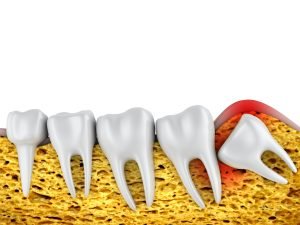Why Removing Wisdom Teeth is Important?

In fact, you might not even have the molars called wisdom teeth.
Wisdom teeth aren’t needed for proper chewing ability, and not everyone develops them.
But if you do, these teeth—two on the top, two on the bottom of the back of your mouth—are the third and final set of molars you’ll get.
They usually try to break through your gums your late teens or early 20s.
Sometimes, wisdom teeth can be impacted, which happens when they try to fit into a spot where there’s no room, which can crowd the rest of your teeth.
This might also happen if they grow in at an angle or flat on their sides, or they might stay in their growth path but get stuck in the jawbone instead of coming through fully.
All of this can lead to problems including pain, cysts, or damage to the nearby teeth, bones, or tissues.
This can also make it harder to clean your teeth properly, which can lead to periodontal symptoms, including swollen and bleeding gums and bad breath.
At Warner Lakes Dental, we are your partners in recognising and treating potential problems with wisdom teeth.
For your ease of mind, we offer you the following information about the process of a wisdom tooth extraction.
During Extraction
Extractions normally take 45 minutes or less, though more complicated cases may require more time.
To ensure a painless experience, you will receive some type of anaesthesia:
- Local anaesthesia: Your Warner dentist will give you a shot of Novocaine to numb the area. Patients who suffer from anxiety or phobia may also be given nitrous oxide, or laughing gas, to relax or even nod off during surgery. Laughing gas wears off extremely quickly
- IV sedation: The surgeon will numb your mouth and also give you drugs through a vein in your arm to make you drowsy. You might sleep during the whole procedure. If you receive IV sedation, you should NOT attempt to drive yourself home
- General anaesthesia: You’ll receive drugs through a vein or as gas through a mask. You’ll sleep through the entire procedure and might sleep for an additional hour or so after the surgery. If you receive general anaesthesia, you should NOT attempt to drive yourself home
Your Warner dentist may have to make an incision in your gums or bone to get the teeth out. If an incision is made, the wounds will be sewed shut so they heal quickly.
These stitches are designed to dissolve after a few days. Your dentist may also place gauze pads in your mouth to soak up the blood.
Post-Care Instructions
After getting a wisdom tooth extracted you may experience pain, swelling, and bleeding.
In most cases you can resume normal activities after the first day, in fact, some people even go back to work on the day of extraction!
But don’t do anything that could dislodge the blood clot from the extraction site. The blood clot is a natural part of the healing process.
- For pain, you can take a prescription painkiller given to you by your dentist or a recommended over-the-counter pain reliever.
- To decrease swelling, place an ice pack over your jaw. The cold helps to reduce the inflammation and ease any discomfort.
- For jaw pain, use warm, wet heat.
- You should avoid brushing, spitting, flossing, and rinsing for 24 hours. After that, you can gently brush your teeth. Rinse your mouth with lukewarm saltwater several times daily to help keep it clean and prevent infection.
- You should eat a soft-food diet for the first day or longer and then move slowly to semi-soft food. Don’t ingest solid foods, alcohol, coffee, soda or hot beverages in the first few days following your procedure.
The recovery period can take several days and swelling and minor discomfort may remain for up to a week or more. Use ice packs, eat soft foods and keep your mouth clean with simple saltwater.
If you notice symptoms like pus discharge, severe pain, or a fever, call your Warner dentist immediately. Complications rarely occur, but if they do they require treatment by a dentist.
The Dental Care Experience in Warner
Warner Lakes Dental makes your visit the quickest and most convenient dental experience possible.
From parking to treatment, we make the entire process as comfortable and straightforward as possible.
From routine check-ups and cleans to dental implants, extractions, and cosmetic procedures, Warner Lakes Dental is your partner in dental health.
Dr Shilpa Gupta is Warner Lakes Dental’s principal dentist. Her dedication to excellence on every level motivates and inspires the whole team always to be learning, improving, and finding new ways to improve patient care and comfort.
Her special interests are in cosmetic dentistry, the Invisalign teeth straightening technology, advances in endodontics (root canal therapy), and new technologies such as The Wand, for painless injections.
Call us on (07) 3477 9925 or visit us at Warner Lakes Medical Precinct, 1185B Old North Road in Warner.
